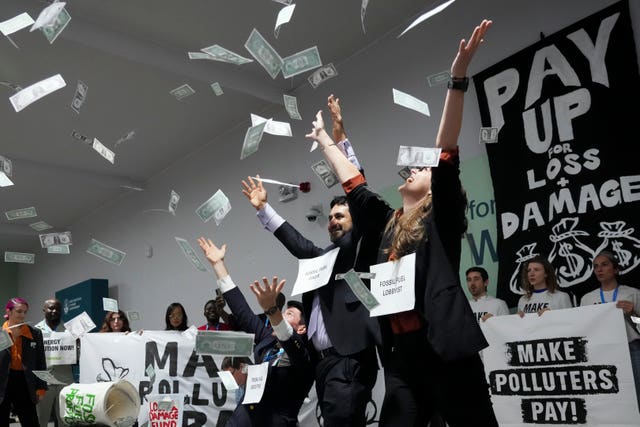Countries must “soften hard lines” to reach a deal on finance, the United Nations chief said as international climate talks in Azerbaijan go down to the wire.
Speaking at Cop29 in Baku, UN secretary-general Antonio Guterres said “failure is not an option” as countries remain deeply divided over key issues with one day left to go.
A major split among countries cemented on Thursday after the release of the latest proposals for a deal on climate finance for poorer nations to cope with impacts from global warming and green their economies.
Mr Guterres told delegates that he sensed an “appetite for agreement” as Cop29 goes “now down to the wire”.
“But let’s be frank, many substantial differences remain,” he said.
“We need a major push to get discussions over the finishing line to deliver an ambitious and balanced package on all pending issues with a new finance goal at its heart.”
The UN secretary-general went on to warn that failure at Cop29 could jeopardise national climate action plans with “potentially devastating impacts as universal tipping points are getting closer”.
As proposals and negotiations remain muddied, Mr Guterres said countries need to find a “clear” agreement on climate finance.
He said: “Amidst geopolitical divisions and uncertainties, the world needs countries to come together here in Baku.
“So, I appeal directly to ministers and negotiators: soften hard lines. Navigate a path through your differences and keep your eyes on the bigger picture.

Negotiations on Thursday turned to finding a landing ground on climate finance after two diametrically opposing options for a deal were put forward.
On one end of the spectrum, poorer countries want to see rich nations paying at least one trillion dollars a year from 2025 in forms of finance that would avoid saddling them with more debt.
On the other, vague proposals were floated on richer nations paying trillions in all forms of finance each year by 2035, which likely appeals to some industrialised countries.
Several nations such as the UK, EU, Australia and New Zealand also stepped up calls for a new deal that builds on last year’s agreement to phase out fossil fuels – something which has faced significant pushback from oil rich nations such as Saudi Arabia.
Fears over backsliding on the landmark Cop28 agreement have been growing in recent days after G20 leaders stopped short of directly mentioning the issue in their communique from Brazil, where they met earlier this week.
Asked about what a repeat of this in the Baku deal would mean for meeting the 2015 Paris Agreement goal of limiting warming to 1.5C, Mr Guterres said: “There are areas of language and there are areas of reality.
“For me, it is clear that science stresses there will be no way to reach 1.5C – the limit of global warming – if there is not a phase out of fossil fuels… in the context of a just transition.”

The UK has long been pushing for countries to support this landmark Cop28 agreement and incorporate it into their national climate action plans, otherwise known as Nationally Determined Contributions (NDCs).
But it stepped up those calls on Thursday after the latest proposals were released.
At a press conference, UK climate envoy Rachel Kyte said: “At Cop28, we agreed NDCs should be economy wide, 1.5C aligned and cover all greenhouse gasses.
“In the context of what we’re doing here at Cop29, (it) is important that we cannot slide back from this agreement and we should collectively agree to move forward to act on this agreement.
“We hope that other countries, especially major economies, will respond to this call and we welcome the indications from some countries that they are ready to do so in the coming days and months.”
The EU reflected a similar position with the European Commissioner for Climate Action, Wopke Hoekstra, saying the current proposals are “clearly unacceptable”.






